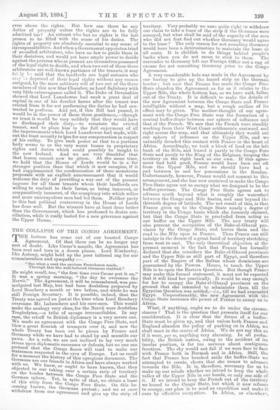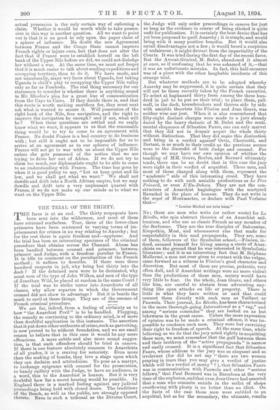THE COLLAPSE OF THE CONGO AGREEMENT. T HE bottom has come
out of our boasted Congo Agreement. Of that there can be no longer any sort of doubt. Like Caesar's mantle, the Agreement has been rent and torn in a dozen places. Lord Kimberley, like Antony, might hold up the poor tattered rag for our commiseration and sympathy " See what a rent the envious Frenchmen made, Through this the well-beloved Germans stabbed."
He might recall, too, " the first time ever Caner put it on." It was a spring morning, " the day he overcame the Nervii." The Agreement, it will be remembered, was pro- mulgated last May, but had been doubtless prepared by Lord Rosebery a month or two before, and while he was still Foreign Secretary. It is possible, indeed, that the Treaty was agreed on just at the time when Lord Rosebery overcame Mr. Labouchere and his cave-men. This would make the analogy very close, for the Nervii were doubtless Troglodytes,—a tribe of savage irreconcilables. In any case, the rebuff to British diplomacy is a very severe one. We made an agreement with the Congo Free State, and blew a great flourish of trumpets over it, and now the whole Treaty has been cut to pieces by France and Germany while we have had to stand by and mumble our paws. As a rule, we are not inclined to lay very much stress upon diplomatic successes or defeats, but no one can pretend that the Congo fiasco will tend to make our statesmen respected in the eyes of Europe. Let us recall for a moment the history of this egregious document. The Germans are our Mends in Africa and have always worked with us. We knew, or ought to have known, that they objected to our taking over a certain strip of territory on the border between the Congo Free State and the German sphere. Yet, in spite of that, we obtain a lease of this strip from the Congo Free State. On this be- coming known, the Germans protest ; and we at once withdraw from our agreement and give up the strip of territory. Very probably we were quite right to withdraw our claim to take a lease of the strip if the Germans were annoyed, but what shall be said of the sagacity of the men who did not first find out whether Germany would agree to the lease ? The only reason for not sounding Germany would have been a determination to maintain the lease at all costs. It is childish to do things behind people's backs when you do not mean to stick to them. The surrender to Germany left our Foreign Office not a rag of excuse for not consulting Germany prior to the Congo Agreement. A very considerable hole was made in the Agreement by our having to give up the leased strip on the German border ; but now that France has made the Congo Free State abandon the Agreement as far as it relates to the Upper Nile, the whole bottom has, as we have said, fallen out of the Treaty. It is difficult to make the details of the new Agreement between the Congo State and France intelligible without a map, but a rough outline of its effect may be given. The mother-thought of our agree- ment with the Congo Free State was the formation of a neutral buffer-State between our sphere of influence and that of the French. We saw that the French were steadily working from their West Coast settlements eastward and right across the map, and that ultimately they would cut our sphere of influence on the Upper Nile, and we naturally dreaded this contact with France in the heart of Africa. Accordingly, we took a block of land on the left bank of the Nile, and leased it partly to the Congo Free State and partly to the King of the Belgians, keeping the territory on the right bank as our own. If this agree- ment had held good, Franco would have been cut off from the Upper Nile, and we should have had a pad between us and her possessions in the Soudan. Unfortunately, however, France would not consent to this arrangement, and she has now contrived to make the Congo Free State agree not to occupy what we designed to be the buffer-province. The Congo Free State agrees not to advance north beyond what is roughly the watershed between the Congo and Nile basins, and east beyond the thirtieth degree of latitude. The net result of this, is that France gives up to the Congo State nearly a degree of territory in the Congo basin which she formerly claimed, but that the Congo State is precluded from acting as our buffer on the Upper Nile. The new treaty will also prevent the occupation of the Bahr-el-Ghazal pro- vinces by the Congo State, and leaves them and the road to the Nile open to France. Thus France can still indulge in the dream of a great band of territory stretching from west to east. The only theoretical objection at the present moment is the fact that France has formally declared that she considers the Bahr-el-Ghazal provinces and the Upper Nile as still part of Egypt, and therefore part of the Empire of the Sultan whose dominions are guaranteed by the Powers. Hence, to touch the Upper Nile is to open the Eastern Question. But though France may make this formal statement, it must not be expected that it will bind her practically. It would be easy enough for her to occupy the Bahr-el-Ghazal provinces on the ground that she intended to administer them till the Egyptian Question was settled,—i.e., till we had evacuated Egypt. Unquestionably, the now Agreement with the Congo State increases the power of France to annoy us in Africa.
What, if anything, ought we to do under the circum- stances ? That is the question that presents itself for our consideration. It is clear that the dream of a buffer- State must be given up, and that unless both France and England abandon the policy of pushing on in Africa, we shall meet in the centre of Africa. We do not say this as if it were, per se, anything very alarming. In all proba- bility, the British nation, owing to the accident of its insular position, is far too nervous about contiguoue frontiers. The sky would not fall if we were face to face with France both in Burmah and in Africa. Still, the fact that France has brushed aside the buffer-State we attempted to create, shows that she means to advance towards the Nile. It is, therefore, necessary for us to i make up our minds whether we intend to keep the whole valley of the Upper Nile in our hands, or ouly one side of it. if we intend to keep the French out of the territory we leased to the Congo State, but which it now refuses to occupy, our plan is to send an expedition and make it ours by effective occupation. In Africa, as elsewher?, actual possession is the only certain way of enforcing a claim. Whether it would be worth while to take posses- sion in this way is another question. All we want to point out is that it is no good to rely upon the paper claim of a sphere of influence. No doubt the new Agreement between France and the Congo State cannot improve French rights or injure ours, but that does not alter the fact that if France were to establish herself on the left bank of the Upper Nile before we did, we could not dislodge her without a war. At the same time, we must not forget that it is much easier to talk about sending expeditions and occupying territory, than to do it. We have made, and not unnaturally, many wry faces about Uganda, but taking Uganda is child's play to occupying the Upper Nile valley only as far as Faschoda. The real thing necessary for our statesmen to consider is whether there is anything sound in Mr. Rhodes's plea for a great line of communication from the Cape to Cairo. If they decide there is, and that this route is worth making sacrifices for, they must next ask what is wanted to secure it. Will possession of the right bank of the Nile, free navigation, and the right to improve the navigation be enough ? and if not, what will be ? When these questions are settled and we really know what we want, it appears to us that the reasonable thing would be to try to come to an agreement with France. No doubt France is a bad country to do business with ; but still it ought not to be impossible for us to arrive at an agreement as to our spheres of influence. France will not go to war with us about the Upper Nile unless she gets possessed of the notion that we are trying to drive her out of Africa. If we do not try to claim too much, our diplomatists ought to be able to come to an understanding with France. The time has gone by when it is good policy to say, "Let us keep quiet and lie low, and we shall get what we want." We shall not dawdle and drift into a North African empire, but we may dawdle and drift into a very unpleasant quarrel with France, if we do not make up our minds as to what we want on the Upper Nile.



































 Previous page
Previous page